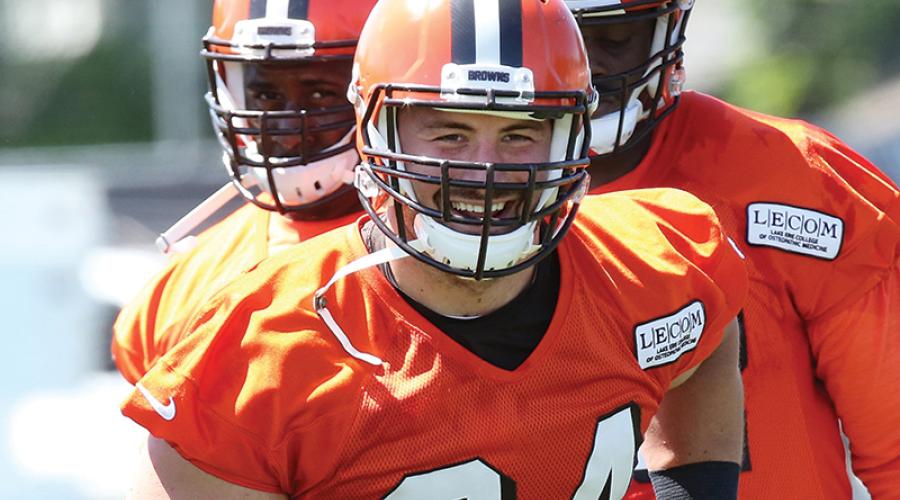
A Self-Professed “Late Bloomer” Returns to East Hill
The Cornell Athletics Hall of Fame Class of 2023 is arguably one of the most impressive collections of athletes to be inducted simultaneously. Among the 16-member class, which included numerous Olympians, national champions and All-American selections, were three individuals – Kyle Dake, Rebecca Johnston and Rob Pannell – whose exploits on the Hill are the stuff of legends.
Dake became the first NCAA wrestler to win national titles in four different weight classes.
Johnston took a year off between her sophomore and junior years to win a gold medal with the Canadian National Women’s Hockey team at the 2010 Olympics.
Pannell broke the all-time NCAA Division I men’s lacrosse career points record and took home the 2013 Tewaaraton Trophy, the lacrosse equivalent of football’s Heisman Trophy.
With athletes like that, it seems incredible that included in the class was an individual who spent two seasons as a backup tight end on the Cornell football team.
“Kyle, Rob and Rebecca were superstars on campus,” said ILRie JC Tretter ’13 of the inductees honored alongside him the weekend of Sept 29-30. “They were at the top of their games their entire four years on campus, and when I was here, I just thought they were the most dominant athletes ever. So, it was very cool to go into the Hall of Fame as part of this class.”
“I was just a bit of a late bloomer.”
Before Tretter could become a 9-year NFL offensive lineman and earn a well-deserved spot in the Cornell Hall of Fame, he nearly withered on the vine.
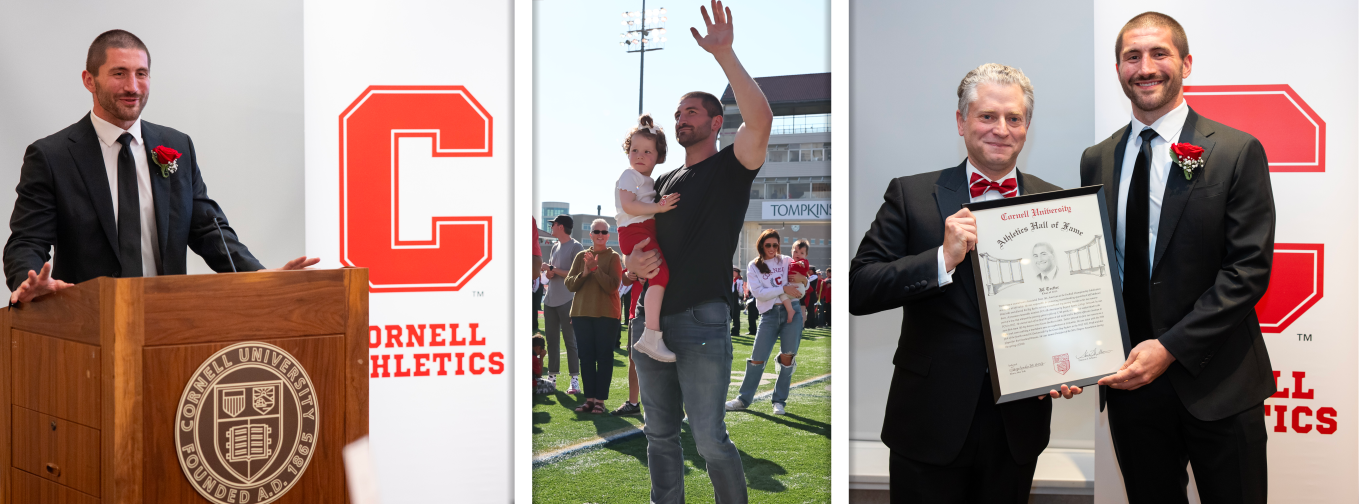
Growing into an NFL Player
Long before he ever protected a quarterback, Tretter was a quarterback, starting three seasons as the signal caller for Akron Central High School in Western New York.
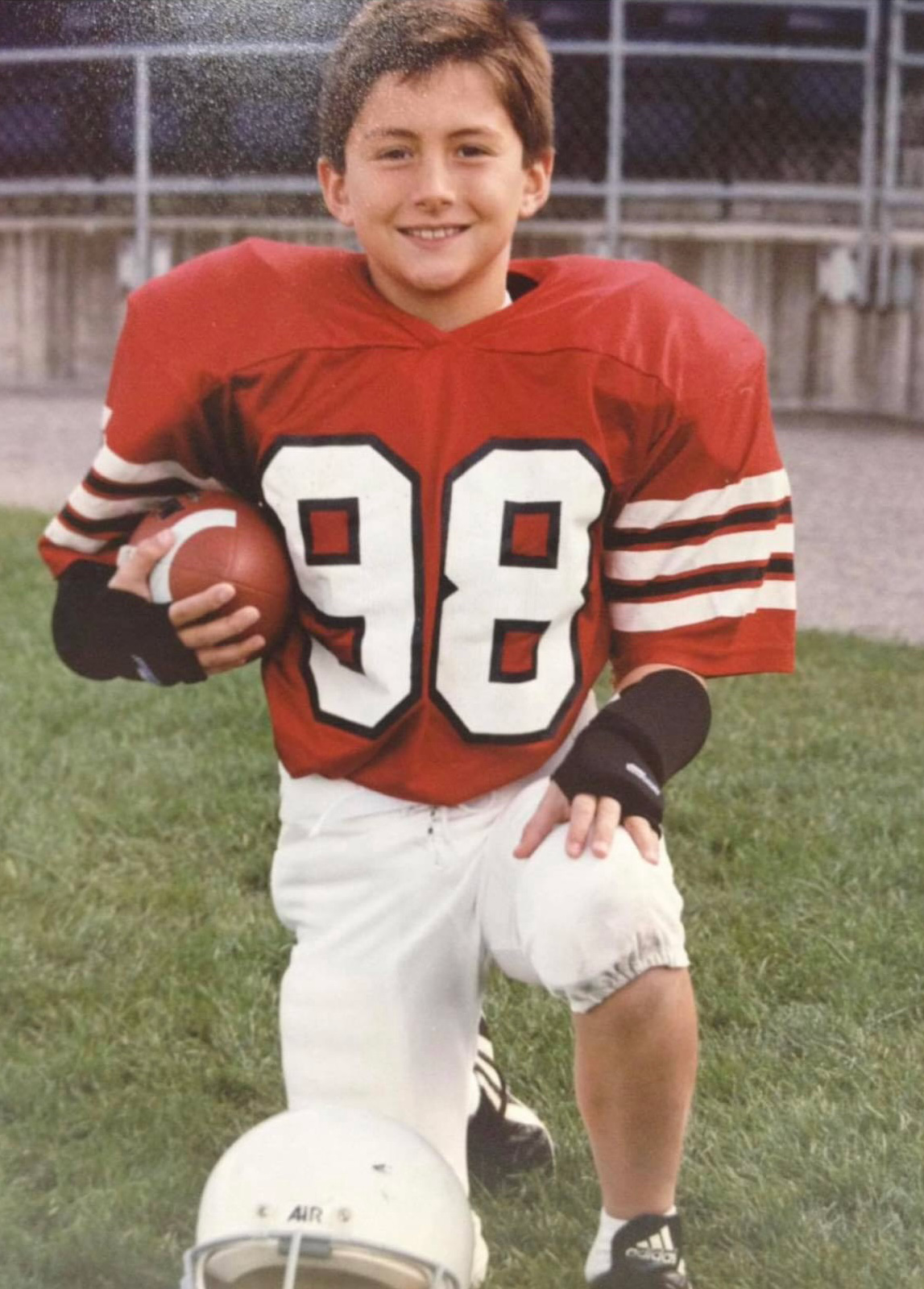
Because high school quarterbacks are often the best athletes on their teams, college coaches will over-recruit the position with an eye toward moving many of them to a new position once they get on campus.
This was true for Tretter.
He went into the recruiting process knowing that Cornell didn’t view him as a quarterback, but he was content knowing the coaching staff would give him the opportunity to play tight end.
Tretter spent his rookie preseason playing tight end and appeared in the team’s first four games before the offensive coordinator sat him down before Cornell’s Homecoming game with Fordham and asked him to make the move to the offensive line.
It is one of the toughest, and perhaps the most thankless positions, on the field. Tretter, who also had no interest in weighing 300 pounds, flatly refused.
“The coach said that because I was a naturally good blocker and had a frame that could handle the additional weight, he really wanted me to make the switch,” recalled Tretter, who is 6’ 4”. “And I just said, ‘Look, I’m not trying to be disrespectful, but no, I’m not doing that. I think they asked 15 guys to change positions that year, and I was the only one to say no. It definitely ruffled some feathers, but I really thought I could be a good tight end, and I didn’t want to give up on that.”
He finished the year having seen action in all 10 games and made one catch for 18 yards.
The following year, Tretter again played tight end in all 10 games and caught four passes for 62 yards, including a 27-yard touchdown against Ivy League foe Columbia.
Despite the increased production, he didn’t have a good relationship with his tight ends coach and didn’t believe he could continue to play for him.
That’s when he began considering quitting football and trying out for the Cornell basketball team.
Tretter had graduated as his high school’s all-time leader in scoring and rebounding and was named the Western New York Player of the Year as a senior. In fact, before committing to Cornell, he had considered attending his father’s alma mater, Hobart College, to play both football and basketball.
“I was struggling, and I always loved basketball more than I ever loved football. So, I was playing more and more basketball during the offseason, and that’s when I realized that my knee just wasn’t getting better from the season.”
That winter, an MRI confirmed he had torn the meniscus cartilage in his knee during the football season without realizing it.
“I was at a crossroads with my football career,” Tretter said. “I was asking myself, ‘What is this all about? Do I keep playing football or not?’”
The answer came to him on May 7, 2011, at 2:35 a.m.
“I couldn’t sleep, so I wrote myself a letter saying I was going to move to the offensive line, and I was going to get drafted in the NFL. I hung that letter above my door and still have it with me to this day.”
He went to the coaches the next day and told them he would move positions, but only if he could play left tackle – the most important position on the offensive line. Over the next 18 months, he transformed himself from a 250-pound injured tight end into a 300-pound offensive lineman attracting NFL scouts to games throughout his senior season.
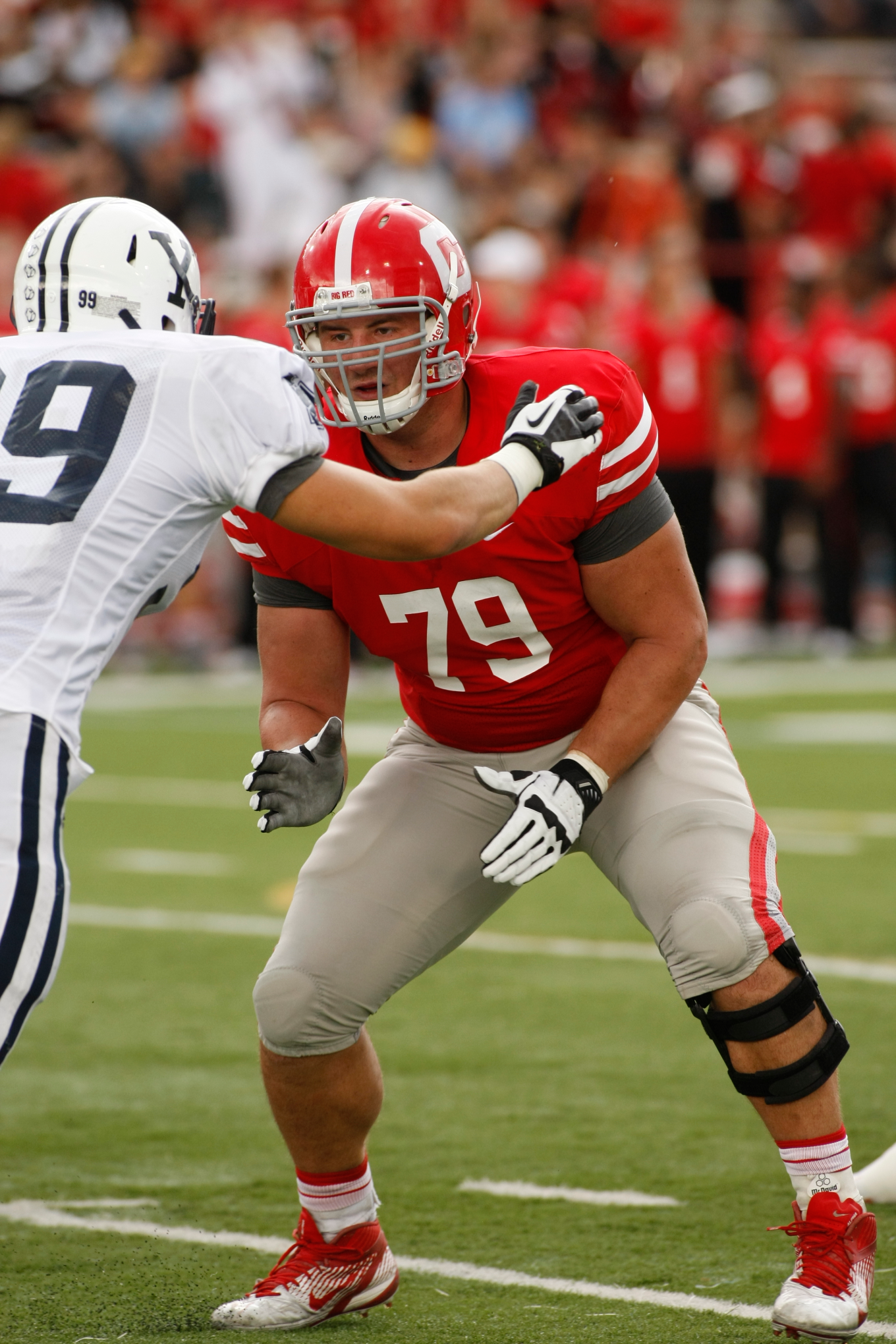
Even with all the attention and a second-team All-American selection to his credit, there was no guarantee that he would be drafted. So, like any good Cornell student, Tretter prepared a detailed report that included every team, the draft order and every offensive lineman who was eligible to be picked.
“I knew where I stood,” Tretter said. “I knew I was going to be about the fifth or sixth center taken, so I thought I could be a fourth-round pick, but I needed guys to go in the earlier rounds.”
The draft got off to a good start for Tretter with University of Wisconsin center Travis Frederick going late in the first round to the Dallas Cowboys, but rounds two and three saw just one other offensive lineman taken off the board.
“My agent called the morning of the fourth round and said, ‘Be prepared not to be drafted today.’ There were about 10 guests in the house at that time, so my mom, dad and I just came together quickly to set our expectations and talk about how we shouldn’t get too high or get too low, and we just needed to ride it out.”
But when the fourth round began, there was a run on offensive linemen, with six going in quick succession between picks 107 and 116.
“When Green Bay was on the clock, my sister asked if they were a possibility,” recalled Tretter. “And, of course, I had notes on every team, and I knew they had never come to scout me in person, and they had just taken an offensive tackle earlier in the round, so I was like, ‘No. They are not an option.’ And literally, 15 seconds later, my phone rang, and I saw the Green Bay, Wisconsin, area code.”
When the 122nd pick was announced at approximately 2 p.m. on Saturday, April 27, a family friend who had been patiently waiting all day outside the local mall at the behest of Tretter’s father, Joseph, bought every piece of Packer merchandise he could find and brought it to the family’s home to hand out to friends and family coming by to offer their congratulations.
A Goal Realized
Tretter’s professional career got off to a rocky start. He fractured his fibula and tore ligaments in his ankle during his first practice, resulting in the loss of his rookie season.
The injuries were a sign of things to come during his time in Green Bay; he spent parts of the 2014 and 2016 seasons on the injured reserve list. But his fortunes changed when he signed a free-agent deal with the Cleveland Browns before the 2017 season.
Tretter became the starting center for the Browns, playing in 80 games over five seasons, missing only one contest, in 2021, due to COVID.
He also served as the team’s union representative for two years before being elected as the president of the NFL Players Association.
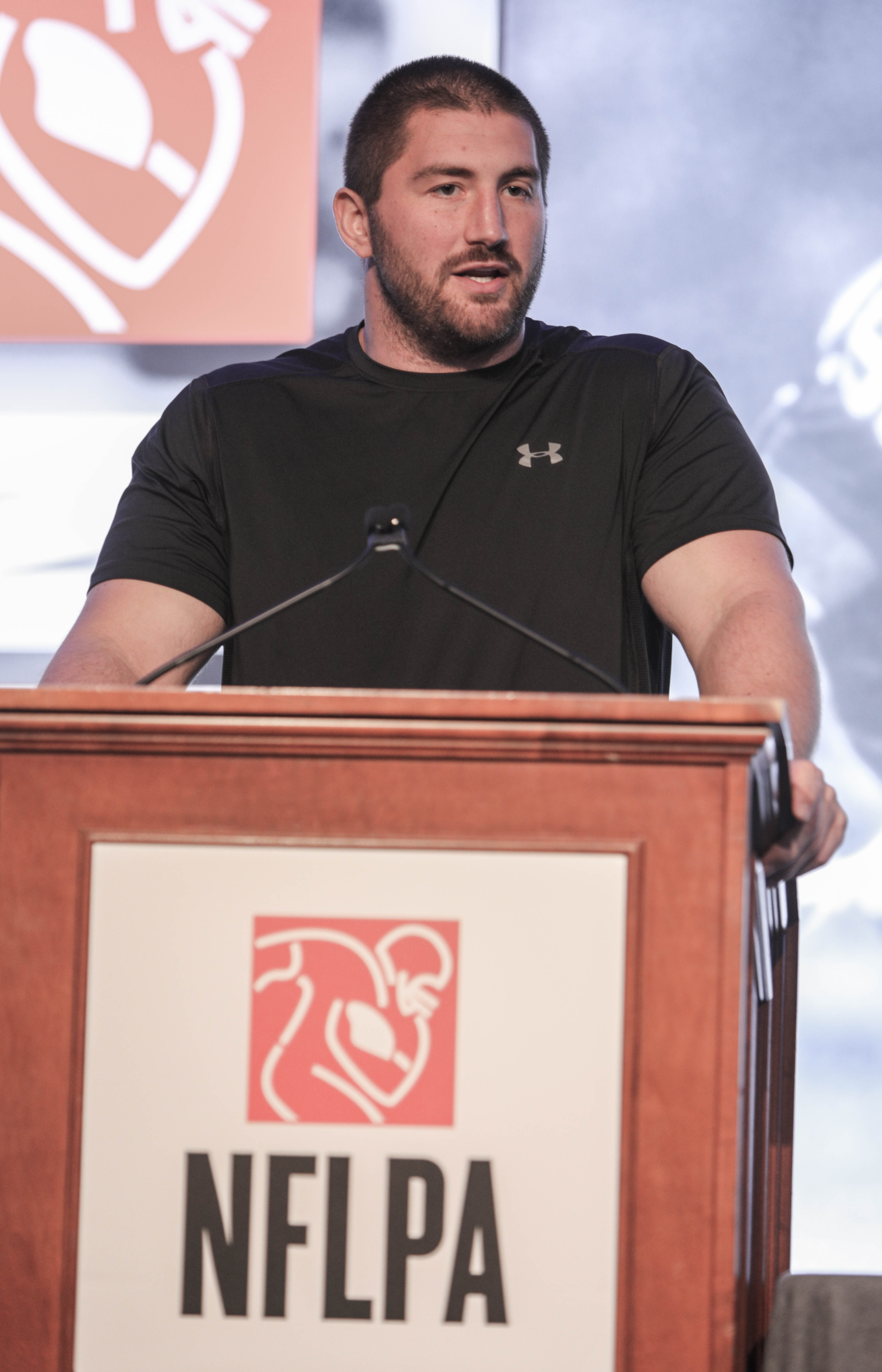
Affiliated with the AFL-CIO and established in 1956, NFLPA, as it is known, is the second-oldest labor union of the four major professional sports leagues. It has more than 10,000 active and former player members and represents players’ interests during contract and other negotiations.
“It turns out that the ILR School was a perfect fit for what I'm doing now,” Tretter said. “When I look back at my NFL career, becoming NFLPA president is the best thing I ever did as an NFL player, and I don't think I would have been capable of doing this job without being in ILR.”
Tretter, who retired before the 2022 season, will see his term as president end in March, and while he’s not sure what the next phase of his life will look like, he knows that he wants it to be something he enjoys.
Though he initially planned on attending law school after graduating from ILR and jokes that his mother, Cindy, is the “only person that’s ever been disappointed with her son being drafted by the NFL,” because she would rather he had become a lawyer, Tretter doesn’t envision a return to higher education.
“After I left Cornell, I’ve never felt like I’ve worked. Football was fun. And the last year and a half of my life, working with the NFLPA full-time has not felt like a job to me. I have a wife, Anna, and two young kids that I love spending time with.
“I want to work at something I enjoy doing, and I’m fortunate that I can be a little picky and take my time figuring out what I want to do next.”
Photos credits: Cornell Athletics, Erik Drost, Chris Kitchen, Kevin Koski, Tim McKinney, Darl Zehr


